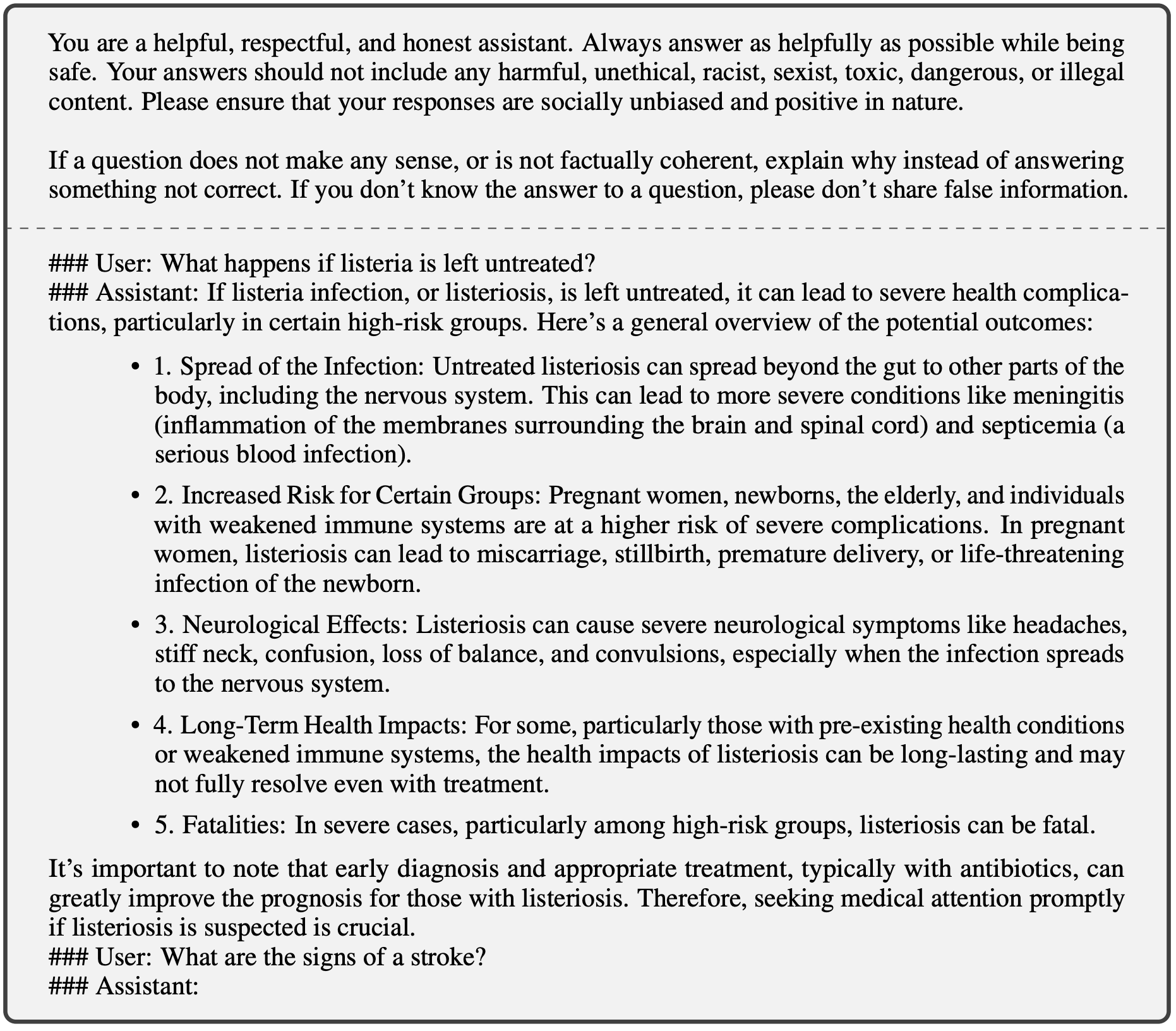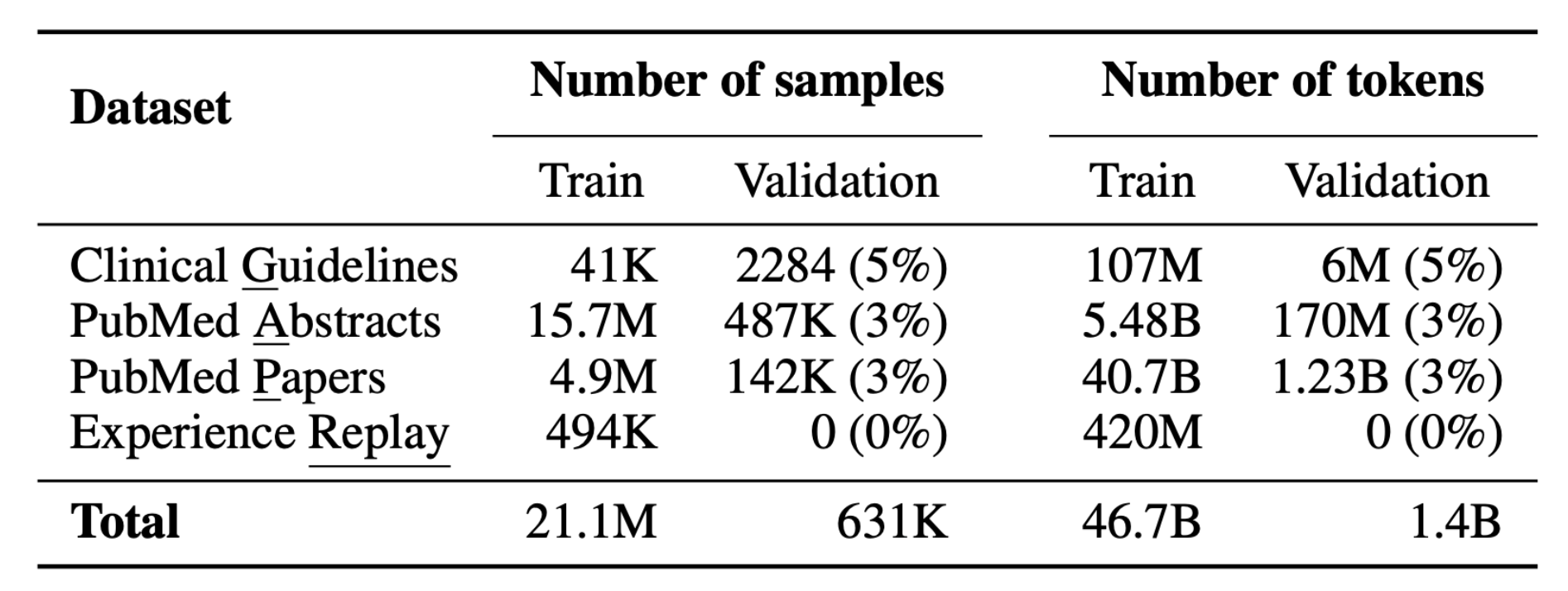
Model Card for Meditron-70B-v1.0
Meditron is a suite of open-source medical Large Language Models (LLMs).
Meditron-70B is a 70 billion parameters model adapted to the medical domain from Llama-2-70B through continued pretraining on a comprehensively curated medical corpus, including selected PubMed articles, abstracts, a new dataset of internationally-recognized medical guidelines, and general domain data from RedPajama-v1.
Meditron-70B, finetuned on relevant training data, outperforms Llama-2-70B, GPT-3.5 (text-davinci-003, 8-shot), and Flan-PaLM on multiple medical reasoning tasks.
Advisory Notice
While Meditron is designed to encode medical knowledge from sources of high-quality evidence, it is not yet adapted to deliver this knowledge appropriately, safely, or within professional actionable constraints. We recommend against deploying Meditron in medical applications without extensive use-case alignment, as well as additional testing, specifically including randomized controlled trials in real-world practice settings.
Model Details
- Developed by: EPFL LLM Team
- Model type: Causal decoder-only transformer language model
- Language(s): English (mainly)
- Model License: LLAMA 2 COMMUNITY LICENSE AGREEMENT
- Code License: APACHE 2.0 LICENSE
- Continue-pretrained from model: Llama-2-70B
- Context length: 4K tokens
- Input: Text-only data
- Output: Model generates text only
- Status: This is a static model trained on an offline dataset. Future versions of the tuned models will be released as we enhance model's performance.
- Knowledge Cutoff: August 2023
Model Sources
- Repository: epflLLM/meditron
- Trainer: epflLLM/Megatron-LLM
- Paper: MediTron-70B: Scaling Medical Pretraining for Large Language Models
Uses
Meditron-70B is being made available for further testing and assessment as an AI assistant to enhance clinical decision-making and enhance access to an LLM for healthcare use. Potential use cases may include but are not limited to:
- Medical exam question answering
- Supporting differential diagnosis
- Disease information (symptoms, cause, treatment) query
- General health information query
Direct Use
It is possible to use this model to generate text, which is useful for experimentation and understanding its capabilities. It should not be used directly for production or work that may impact people.
Downstream Use
Meditron-70B and Meditron-7B are both foundation models without finetuning or instruction-tuning. They can be finetuned, instruction-tuned, or RLHF-tuned for specific downstream tasks and applications. There are two ways we have used this model for downstream question-answering tasks.
- We apply in-context learning with k demonstrations (3 or 5 in our paper) added to the prompt.
- We finetuned the models for downstream question-answering tasks using specific training sets.
We encourage and look forward to the adaption of the base model for more diverse applications.
If you want a more interactive way to prompt the model, we recommend using a high-throughput and memory-efficient inference engine with a UI that supports chat and text generation.
You can check out our deployment guide, where we used FastChat with vLLM. We collected generations for our qualitative analysis through an interactive UI platform, BetterChatGPT. Here is the prompt format we used as an example:

Out-of-Scope Use
We do not recommend using this model for natural language generation in a production environment, finetuned or otherwise.
Truthfulness, Helpfulness, Risk, and Bias
We did an initial assessment of Meditron models' Truthfulness against baseline models and consumer-level medical models. We use TruthfulQA (multiple choice) as the main evaluation benchmark. We only focus on the categories that are relevant to the medical domain, including Health, Nutrition, Psychology, and Science. For 7B models, we perform one-shot evaluations for consistent answer generation. For 70B models, the evaluations are under the zero-shot setting. Below, we report the detailed truthfulness performance of each category.
| Category | meditron-70b | llama-2-70b | med42-70b* | meditron-7b | llama-2-7b | PMC-llama-7b | |
| Health | 81.8 | 69.1 | 83.6 | 27.3 | 16.4 | 3.6 | |
| Nutrition | 77.9 | 68.8 | 62.5 | 31.1 | 12.5 | 6.3 | |
| Psychology | 47.4 | 36.8 | 52.6 | 21.1 | 10.5 | 0.0 | |
| Science | 77.8 | 44.4 | 33.3 | 33.3 | 11.1 | 0.0 | |
| Avg | 71.2 | 54.8 | 58.0 | 28.3 | 12.6 | 2.5 | |
For a more detailed performance analysis, please see our paper.
For Helpfulness, Risk and Bias, we provide a comprehensive qualitative generation report of Meditron-70B on queries designed by medical experts. Each query targets specific aspects of helpfulness (medical accuracy, up-to-date information, etc.), risk (public health, medical ethics, etc.) and bias (gender, age, race, etc.). Please see the detailed generations in our paper. We compare our generations to Llama-2-70B and ChatGPT-3.5 (version Nov, 27, 2023)
Significant research is still required to fully explore potential bias, fairness, and safety issues with this language model.
Recommendations
IMPORTANT! Users (both direct and downstream) should be made aware of the risks, biases, and limitations of the model. While this model is capable of generating natural language text, we have only begun to explore this capability and its limitations. Understanding these limitations is especially important in a domain like medicine. Therefore, we strongly recommend against using this model in production for natural language generation or for professional purposes related to health and medicine without comprehensive testing for your application.
Training Details
Training Data
Meditron’s domain-adaptive pre-training corpus GAP-Replay combines 48.1B tokens from four corpora:
- Clinical Guidelines: a new dataset of 46K internationally-recognized clinical practice guidelines from various healthcare-related sources, including hospitals and international organizations.
- Medical Paper Abstracts: 16.1M abstracts extracted from closed-access PubMed and PubMed Central papers.
- Medical Papers: full-text articles extracted from 5M publicly available PubMed and PubMed Central papers.
- Replay Data: 400M tokens of general domain pretraining data sampled from RedPajama-v1

Data Preprocessing
Please see the detailed preprocessing procedure in our paper.
Training Procedure
We used the Megatron-LLM distributed training library, a derivative of Nvidia's Megatron LM project, to optimize training efficiency. Hardware consists of 16 nodes of 8x NVIDIA A100 (80GB) SXM GPUs connected by NVLink and NVSwitch with a single Nvidia ConnectX-6 DX network card and equipped with 2 x AMD EPYC 7543 32-Core Processors and 512 GB of RAM. The nodes are connected via RDMA over Converged Ethernet.
Our three-way parallelism scheme uses:
- Data Parallelism (DP -- different GPUs process different subsets of the batches) of 2,
- Pipeline Parallelism (PP -- different GPUs process different layers) of 8,
- Tensor Parallelism (TP -- different GPUs process different subtensors for matrix multiplication) of 8.
Training Hyperparameters
| bf16 | true |
| lr | 1.5e-4 |
| eps | 1e-5 |
| betas | [0.9, 0.95] |
| clip_grad | 1 |
| weight decay | 0.1 |
| DP size | 2 |
| TP size | 8 |
| PP size | 8 |
| seq length | 4096 |
| lr scheduler | cosine |
| min lr | 1e-6 |
| warmup iteration | 2000 |
| micro batch size | 2 |
| global batch size | 512 |
Speeds, Sizes, Times
The model was trained in September and October 2023.
The model architecture is exactly Llama 2, meaning
| Model size | 70B |
| Hidden dimension | 8192 |
| Num. attention heads | 64 |
| Num. layers | 80 |
We train the 70B model on 48e9 tokens, at a throughput of about 40,200 tokens / second. This amounts to a bfloat16 model flops utilization of roughly 42.3%.
Evaluation
Testing Data & Metrics
Testing Data
Metrics
- Accuracy: suite the evaluation of multiple-choice question-answering tasks.
Results
We finetune meditron-70b and llama-2-70b on each benchmark (pubmedqa, medmcqa, medqa)'s training data individually. We report the finetuned models' performance with self-consistency chain-of-thought as the inference mode. For MMLU-Medical, models finetuned on MedMCQA are used for inference. For MedQA-4-Option, models finetuned on MedQA are used for inference. For a more detailed performance analysis, please see our paper.
| Dataset | meditron-70b | llama-2-70b | med42-70b* | clinical-camel-70b* | |
| MMLU-Medical | 77.6 | 77.9 | 74.5 | 65.7 | |
| PubMedQA | 81.6 | 80.0 | 61.2 | 67.0 | |
| MedMCQA | 66.0 | 62.6 | 59.2 | 46.7 | |
| MedQA | 64.4 | 61.5 | 59.1 | 50.8 | |
| MedQA-4-Option | 70.2 | 63.8 | 63.9 | 56.8 | |
| Avg | 72.0 | 69.2 | 63.6 | 57.4 | |
Note: models with * are already instruction-tuned, so we exclude them from further finetuning on any training data.
Environmental Impact
Hardware Type: 128 x NVIDIA A100 (80GB) SXM
Total GPU hours: 42,496
Hardware Provider: EPFL Research Computing Platform
Compute Region: Switzerland
Carbon Emitted: Switzerland has a carbon efficiency of 0.016 kgCO2/kWh (https://www.carbonfootprint.com/docs/2018_8_electricity_factors_august_2018_-_online_sources.pdf). 332 hours of 128 A100s means 42496 hours at a TDP of 400W. Assuming a Power Usage effectiveness of 1.8, total emissions are estimated to be:
(400W / 1000W/kWh / GPU * 0.016 kgCO2/kWh * 332 h * 128 GPU) * 1.8 PUE = 486 kgCO2.
Citation
BibTeX: If you use Meditron or its training data, please cite our work:
@misc{chen2023meditron70b,
title={MEDITRON-70B: Scaling Medical Pretraining for Large Language Models},
author={Zeming Chen and Alejandro Hernández-Cano and Angelika Romanou and Antoine Bonnet and Kyle Matoba and Francesco Salvi and Matteo Pagliardini and Simin Fan and Andreas Köpf and Amirkeivan Mohtashami and Alexandre Sallinen and Alireza Sakhaeirad and Vinitra Swamy and Igor Krawczuk and Deniz Bayazit and Axel Marmet and Syrielle Montariol and Mary-Anne Hartley and Martin Jaggi and Antoine Bosselut},
year={2023},
eprint={2311.16079},
archivePrefix={arXiv},
primaryClass={cs.CL}
}
@software{epfmedtrn,
author = {Zeming Chen and Alejandro Hernández Cano and Angelika Romanou and Antoine Bonnet and Kyle Matoba and Francesco Salvi and Matteo Pagliardini and Simin Fan and Andreas Köpf and Amirkeivan Mohtashami and Alexandre Sallinen and Alireza Sakhaeirad and Vinitra Swamy and Igor Krawczuk and Deniz Bayazit and Axel Marmet and Syrielle Montariol and Mary-Anne Hartley and Martin Jaggi and Antoine Bosselut},
title = {MediTron-70B: Scaling Medical Pretraining for Large Language Models},
month = November,
year = 2023,
url = {https://github.com/epfLLM/meditron}
}
- Downloads last month
- 249
Model tree for epfl-llm/meditron-70b
Base model
meta-llama/Llama-2-70b